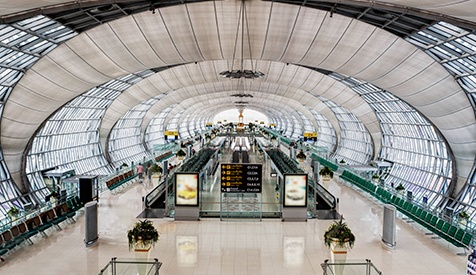Is the travel retail industry ready to embrace digital?
The year’s Trinity Forum in Bangkok, hosted by King Power and Airports of Thailand, and organised by Airports Council International and the Moodie Davitt report, sent a clear signal that the travel retail industry is changing.
The Trinity Forum brings together leaders from across the travel industry (airports, brands and retailers) to discuss the drivers of commercial revenue; this covers income streams such as retail, foodservice, parking, lounges and advertising.
Although travel termini provide some of the most productive physical commercial space of all property asset types, airport operators globally are only just beginning to think seriously about ecommerce and the digital customer journey. After all, while global duty-free sales in 2016 reached $45.7bn, Amazon alone generated $136bn.
The importance of meaningful passenger segmentation is widely recognised
Speakers and panellists from various companies highlighted the vastly different needs and requirements of passenger segments, with ‘millennials’ and ‘Chinese’ most frequently mentioned. By singling out such large groups, however, can segmentation be meaningful and relevant? To achieve true personalisation for global consumers in the travel retail industry, data needs to be captured and used intelligently.
The new travel retail equation is products + data + logistics
The travel retail community, which historically was heavily reliant on increasing footfall due to growing passenger numbers, is still apprehensive about the impact of global ecommerce players.
That said, when Alibaba Group’s Guru Gowrappan speaks on a platform alongside Dufry’s Julian Diaz, it is clear that times are changing. The pair highlighted the new retail equation to be products + data + logistics. Indeed, Alibaba urged airports and retailers alike to become less transactional and more experiential, and most importantly to embrace data and digital in a way that fosters ecosystem creation, not enterprise domination.
A similar view was echoed by Changi Airport’s Nicole Foo, Fraport’s Jens Paul, Auckland Airport’s Richard Barker and AOE’s Kian Gould, who showcased how digital disruption can help to create a platform that connects industry players and, in Auckland’s case, add true value to the traveller by making the process of claiming VAT refunds more seamless.
The jury is still out on what ‘success’ looks like for retail ecommerce in airports. Is it a passenger service that creates an, in Finavia’s Elena Stenholm’s words – effortless, experiential and engaging – experience, with a side effect of boosting revenues? Is it about creating operational readiness (i.e. building the systems and capabilities to do ecommerce, with a view to be ready to scale) in preparation for the big take-off? Or is it simply about having to be in it to win it? I definitely agree that having a digital retail strategy is vital to remain relevant for 21st century passenger journeys.
Despite its success to date, stakeholders agree that the current business model is unsustainable
With airports fighting hard to shed their image as ubiquitous, stressful ‘non-places’ by creating something special, there is a lot of focus on creating appealing and localised retail environments. However, airports, retailers and brands still operate in an environment characterised by relatively small average unit sizes coupled with very high rents (and particularly challenging minimum guarantees), leaving little room for experimentation.
L’Oréal’s Vincent Boinay and Lagardère’s Dag Rasmussen emphasised this point, and highlighted the challenges a retailer faces when trying to introduce a less ubiquitous brand when the risk is not shared by the landlord. A new model must focus on creating value for the passenger, with stakeholders as partners.
The exact mechanics of a partner approach still need to be established, be it through joint ventures, open books, profit sharing, rent on gross margin, or other collaborative means. Overall, there was agreement in principle that the times of winning contracts by bidding on MAG (minimum annual guarantees) should be over, although the airport’s shareholders may be less easy to convince!
Recognising the untapped value of responding to the needs of diverse customer groups is a first step towards true personalisation in travel retail that a digital approach can provide.
Whilst there is a very long way to go, especially around harnessing the data, analytics and technology necessary to create compelling digital propositions that truly enhance the passenger’s physical travel experience, our overriding impression from Trinity 2017 is that travel retail is finally ready for the challenge of the digital retail era.
In future blogs we will explore how leading travel stakeholders are responding.
For further reading on this topic, read Accenture’s report Shaping the digital agenda
to drive growth in airlines and travel.
FIND OUT MORE about Javelin Group’s Airports and Travel Hub Futures service line.
